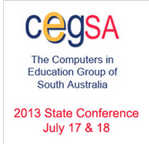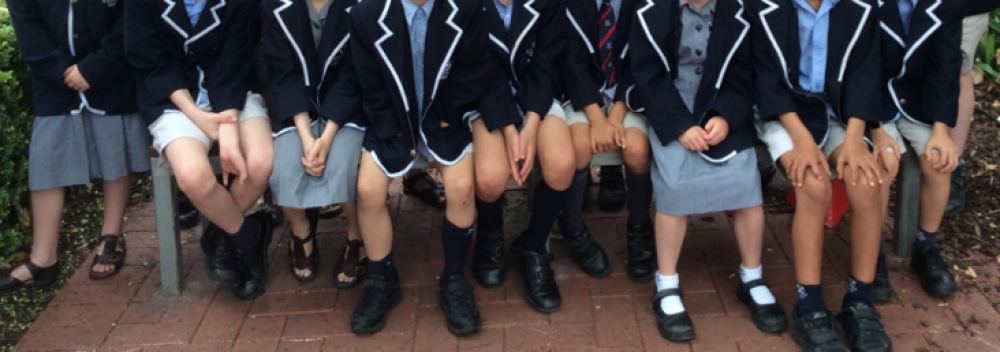I am currently attending the CEGSA/ EdTechSA 2013 conference. 
Today I have listened to 2 keynote speakers Mark Sparvell and Nick Jackson.
The first Keynote speaker was Mark Sparvell who was highly amusing and engaging. The main concepts/ messages I learnt from his keynote were as follows:
1. Technology is the key to taking action within our world today. Technology encourages creativity, socialisation and an active path to engage with society.
2. Technology was not invented to make the teachers job harder (although we may feel like it does sometimes!), we want our students to work harder, not the teacher. Technology is a tool to aid us in meeting learners needs in a complex world where we don’t know what our students need for their future.
3. Do not covet your ideas, give away everything you know and more will come back to you. This idea of collaboration and sharing our knowledge and learning with the world. Making learning relevant and useful. Sharing what we know and seeking answers to things we don’t.
4. There is real learning to be had in conflict. Testing our ideas, sharing and proving our theories, learning from others opinions etc. We need to engage with others to get a global view not simply a single class perspective.
5. The 3 P’s: Play, Project Management and Problem Finding. Engaged and successful students will play to create, explore and understand. Students will manage their own projects (Passion based learning) and direct their learning. Problem Finding: inquiry leads to deeper understanding on a personal level. We want our students to find answers to their own questions in any means suitable to them, using tech has made this easier.
The second Keynote speaker was Nick Jackson whose message about Digital Leaders had me thinking about how to implement this within my own school.
The main concepts/ messages I learnt from his keynote were as follows:
1. Empowerment: the giving or delegation of power or authority, authorisation. Communication is the fundamental concept here surrounded by trust, respect, territory and control. We want to empower our students, give them responsibility and power, take control of their territory (learning environments) and learning and to trust us (their teachers and peers) in this process of learning and life.
2. “Learning is most effective when it is active, involves working on real tasks in collaboration with others- in both virtual and physical settings” (Education Services Australia, 2009 a, p.2). We need to make learning authentic and purposeful. Being connected to our world, global perspectives, the ability to investigate and find answers to real life problems.
3. Digital Leaders: Nick had a team of students who were digital leaders within his school. In Year 6 we have been exploring this in peer modelling/ teaching. We would like to take this one step further and implement Digital Leaders across Year 5 & 6 within our school. Digital leaders, (Tech helpers) assist teachers and peers with their technology learning, via trouble shooting or modelling how to use/ solve issues. I think that this could be done through ICT Club within our school or just within Year 5/6 & 7 classes. The Year 7’s already have a Leadership Program, I think this would fit in nicely within our school context.
After Nick’s keynote presentation I spoke to him about coming to our school and speaking with staff about his findings and work in this area. I think we need to push for teacher & parent involvement/ understanding. Students know how, we need to catch up with them!
Workshops Day 1:
Session 1: iPads across the Curriculum
Organisational structures:
Planners or diaries time management. Synchronize home and school calendars. Day Map (Unley high school timetable) We would use KnowledgeNet here.
Backup to a computer not just iCloud.
iPads are delicate tools. If they get broken suggestion to fix them: Storage minders, Digimob in the City, AllTec fixing iPads.
Have protective cases. Armor cases, look into it.
Reminders to charge at home before school, no charge, use old school paper and pencil.
Homework Apps: Keynote, Pages and Numbers.
Sharing assignments, drop box, email, Knowledge Net or any learning platform.
Airplay, Apple TV useful to connect iPad to the screen as opposed to Interactive whiteboard across Year 6. Suggest to committee.
Pearson textbooks on iPad
Our team will need to find all of the standard apps we want our students to use, these will be purchased first above games and personal apps.
Science Apps:
The Elementals: Periodic table, Nova Elements, The Elements Quiz, GeoWalk SOSE/ Science, Solar Walk explore the solar system interactively. Biology App: iCell, Animal, Bacteria, Cell and cell structure, Puzzling Plates: Geology
Apps to investigate: Popplet, brainstorming map, mind map, Ubersense: Video slow motion video playback. Great for experiment playback, Explain Everything
The Arts
Music
Garageband Smart Instruments, I can play an instrument that I do not know how to use.
Tuner and time keeper both apps free for tuning instruments and keeping time.
Drama
iMovie
Art
Stylus, pad on the end, no lagging and more precise. Jot Classic Stylus, LeetGeek Stall.
SketchBook Pro: $5, good for design
Brushes: drawing app, playback shows the process of making and creating of images. Simplified Photoshop but you cannot put words into Brushes.
Procreate: user friendly again easier to use than Photoshop.
Photoshop
Art Rage
Note: Give students choice with tools on iPad apps, obviously needs to be compatible to hand up etc.
LOTE Language
LanguagePerfect Eg Chinese, Italian. Allows you to practice tones, pronunciation, writing etc. Searches through dictionary much easier, you can draw symbols, do direct searches and get interpretations. The app is free but the school needs to subscribe.
iTunes U: Useful for everything! Easy Chinese, online courses, quizzes, lectures, textbooks etc.
Reflection of session:
4 Students from Unley high school spent the sessions explaining how they use iPads across the curriculum in high school. Suggested apps they use across subjects. Some didn’t match obviously as we are Primary school but some were good suggestions. In relation to specialist staff I would recommend that Music and Art teachers utilise iPads within their programs. Chinese could benefit too.
I think staff should find the apps that we want to use and create a list for our student as part of their booklist, apps should be installed before school begins. We should utilise Google Docs, Calendars, email etc.
Also look into iPad guided app, which locks apps for use during lessons and explore Touch Autism: Social Stories about how to manage my own device.
Session 2 Blogging for Beginners: By Paul Huebl
This afternoon Paul went through the usefulness of blogging with your students and its educational benefits.
Blogging essentially is a learning journal for your students/ class. It improves literacy, writing skills in particular. It documents learning experiences via text, images and videos. It allows students to publish their work to a wider audience.
Many Practical ideas were shared as well as online safety practices. A link to some useful resources when blogging is here:
http://goo.gl/KTO1V
I used part of this session to blog about my personal learning today, and now you have read it!
Looking forward to the Teach Meet session later in the afternoon and Day 2 of the CEGSA conference. I will blog again tomorrow.
Please leave me some feedback, as I am quite new to blogging about my professional learning.
Thanks
Jade









